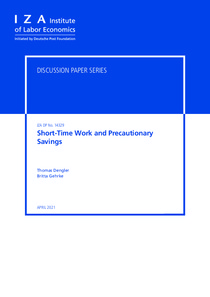Short-time work and precautionary savings

Dengler, Thomas ; Gehrke, Britta
Institute of Labor Economics, Bonn
IZA - Bonn
2021
41 p.
epidemic disease ; short time working ; unemployment benefit ; monetary policy ; business cycle
Discussion Papers
14329
Unemployment
http://ftp.iza.org/dp14329.pdf
English
Bibliogr.
"In the Covid-19 crisis, most OECD countries use short-time work schemes (subsidized working time reductions) to preserve employment relationships. This paper studies whether short-time work can save jobs through stabilizing aggregate demand in recessions. We build a New Keynesian model with incomplete asset markets and labor market frictions, featuring an endogenous firing as well as a short-time work decision. In recessions, short-time work reduces the unemployment risk of workers, which mitigates their precautionary savings motive and aggregate demand falls by less. Using a quantitative model analysis, we show that this channel can increase the stabilization potential of short-time work over the business cycle up to 55%, even more when monetary policy is constrained by the zero lower bound. Further, an increase of the short-time work replacement rate can be more effective compared to an increase of the unemployment benefit replacement rate."
Digital
The ETUI is co-funded by the European Union. Views and opinions expressed are however those of the author(s) only and do not necessarily reflect those of the European Union or the ETUI.